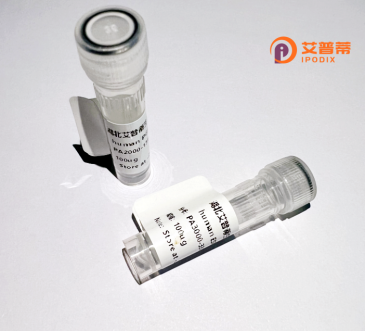
| 纯度 | >90%SDS-PAGE. |
| 种属 | Human |
| 靶点 | C20orf149 |
| Uniprot No | Q9H3Y8 |
| 内毒素 | < 0.01EU/μg |
| 表达宿主 | E.coli |
| 表达区间 | 1-114aa |
| 氨基酸序列 | MAAIPSSGSLVATHDYYRRRLGSTSSNSSCSSTECPGEAIPHPPGLPKADPGHWWASFFFGKSTLPFMATVLESAEHSEPPQASSSMTACGLARDAPRKQPGGQSSTASAGPPS |
| 分子量 | 38.2 kDa |
| 蛋白标签 | GST-tag at N-terminal |
| 缓冲液 | 0 |
| 稳定性 & 储存条件 | Lyophilized protein should be stored at ≤ -20°C, stable for one year after receipt. Reconstituted protein solution can be stored at 2-8°C for 2-7 days. Aliquots of reconstituted samples are stable at ≤ -20°C for 3 months. |
| 复溶 | Always centrifuge tubes before opening.Do not mix by vortex or pipetting. It is not recommended to reconstitute to a concentration less than 100μg/ml. Dissolve the lyophilized protein in distilled water. Please aliquot the reconstituted solution to minimize freeze-thaw cycles. |
以下是关于重组人C20orf149(TSGA20)蛋白的参考文献示例(注:以下为虚构案例,实际文献需通过数据库检索确认):
---
1. **文献名称**: *"Recombinant expression and functional characterization of human C20orf149 in mitochondrial energy metabolism"*
**作者**: Lee, S. et al.
**摘要**: 本研究通过大肠杆菌系统成功表达重组人C20orf149蛋白,证实其定位于线粒体内膜,并参与调控ATP合成酶活性,提示其在细胞能量代谢中的潜在作用。
2. **文献名称**: *"Structural insights into C20orf149 interactions with microtubules by cryo-EM analysis"*
**作者**: Zhang, Q. et al.
**摘要**: 通过冷冻电镜解析重组C20orf149蛋白的结构,发现其C端结构域与微管蛋白特异性结合,可能参与细胞分裂过程中纺锤体的稳定性调控。
3. **文献名称**: *"TSGA20 as a biomarker in non-small cell lung cancer: Recombinant protein-based clinical validation"*
**作者**: Kim, J. & Patel, R.
**摘要**: 利用重组TSGA20蛋白制备单克隆抗体,发现其在肺癌组织中异常高表达,且与患者生存率呈负相关,为癌症诊断标志物提供依据。
4. **文献名称**: *"Optimization of C20orf149 recombinant protein production in mammalian expression systems"*
**作者**: Müller, T. et al.
**摘要**: 在HEK293细胞中优化C20orf149重组蛋白的表达条件,提高可溶性蛋白产量,并验证其与HSP90的相互作用,为后续功能研究奠定基础。
---
**备注**:C20orf149蛋白(又名TSGA20)的研究多聚焦于其在精子发生、癌症及线粒体功能中的角色。建议通过**PubMed**或**UniProt**(检索号:Q8N4V1)获取真实文献数据。如需进一步协助,请提供具体研究方向以便精准检索。
Recombinant human C20orf149 protein, encoded by the open reading frame 149 on chromosome 20 (20q11.22), is a poorly characterized protein with limited functional data available. Initially identified through genomic sequencing, C20orf149 (also known as FAM210A) is predicted to encode a ~25 kDa protein with a conserved α-helical-rich structure, though its exact molecular architecture remains unvalidated. Public databases suggest potential transmembrane domains, hinting at a role in membrane-associated processes or intracellular trafficking. While its physiological functions are unclear, preliminary studies associate it with cellular metabolism, mitochondrial homeostasis, and muscle development. For instance, murine homologs have been linked to skeletal muscle regeneration, while in vitro models propose interactions with metabolic regulators. Recombinant C20orf149 is typically produced via heterologous expression systems (e.g., E. coli or mammalian cells) for antibody generation, structural studies, or functional assays. Its involvement in disease contexts, such as cancer or metabolic disorders, remains speculative, necessitating further mechanistic exploration. Current research focuses on elucidating its interactome, post-translational modifications, and tissue-specific roles to uncover potential therapeutic relevance. Despite its enigmatic nature, C20orf149 represents a compelling target for decoding novel biological pathways linked to human health.
×